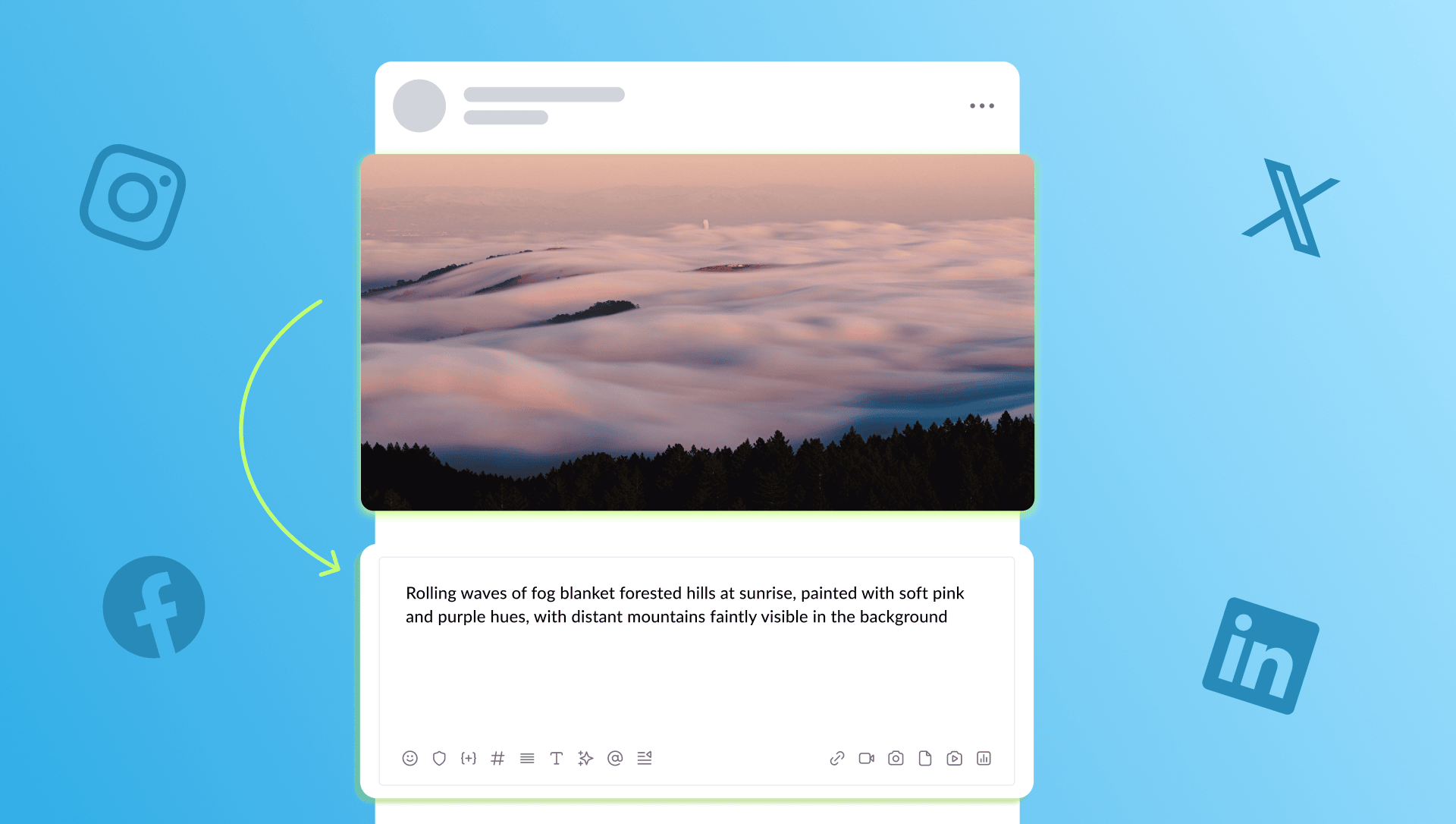New
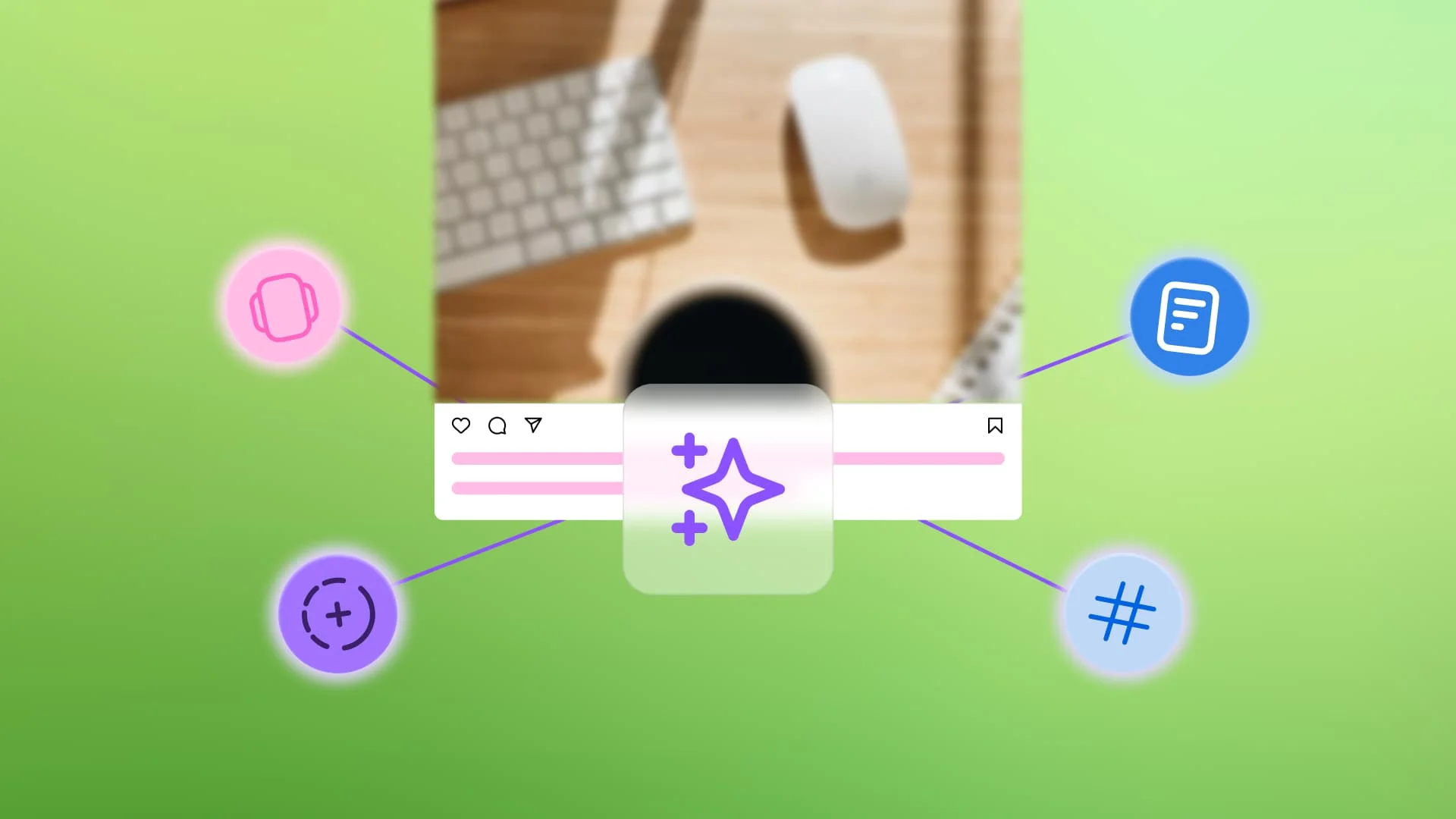
How to Use AI for Instagram: Scripts, Captions, & More
Learn how you can use AI for Instagram—the right way. Get actionable tips for bringing AI into your Instagram strategy building and content creation processes.
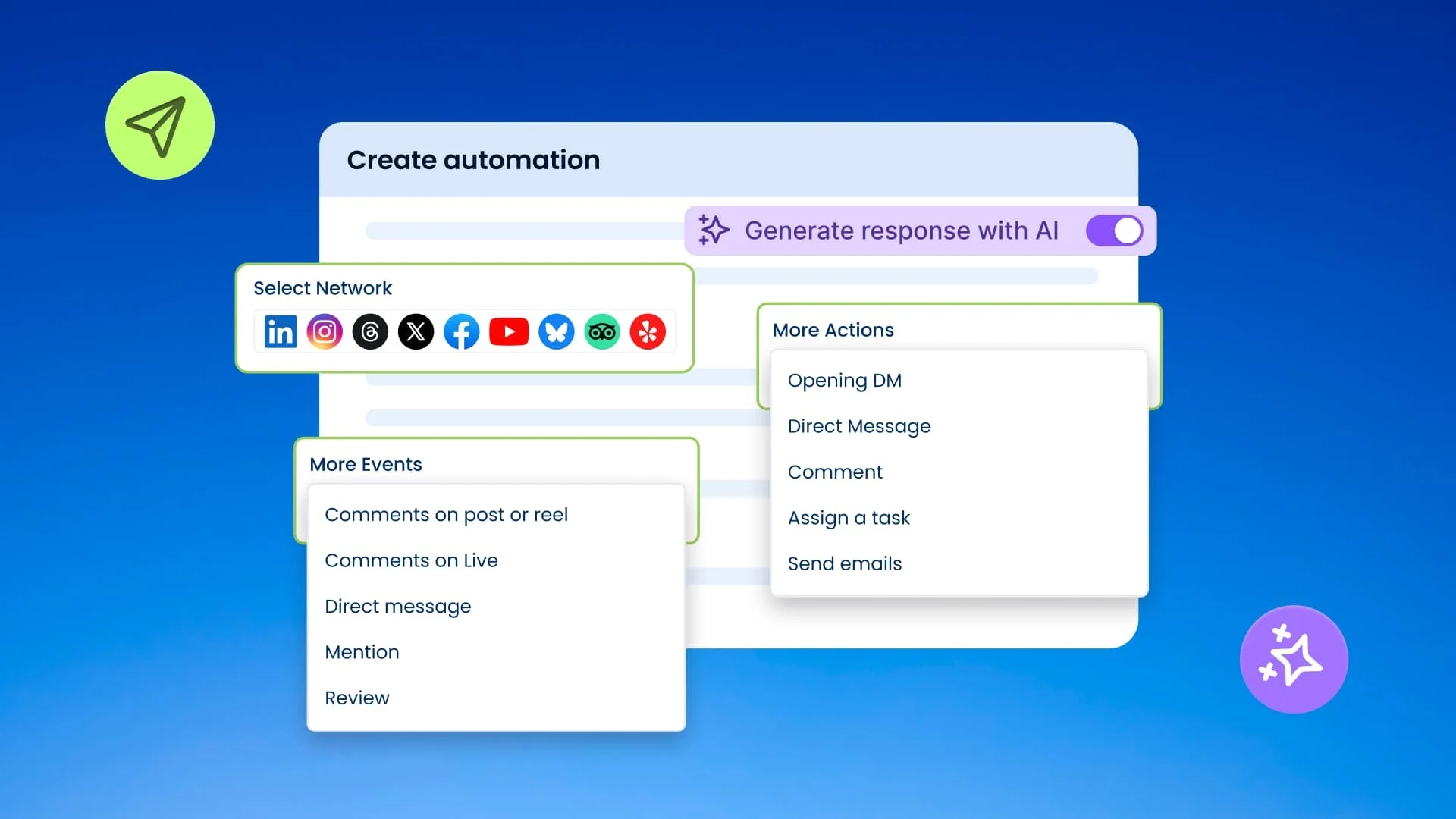
Social Inbox Automation: Put Your Social Conversations on Autopilot
Stop manually managing every comment and DM that comes in.
New

How to Build a Powerful Social Media Marketing Strategy
A social media marketing strategy is a documented plan for how you can promote your brand on social media.
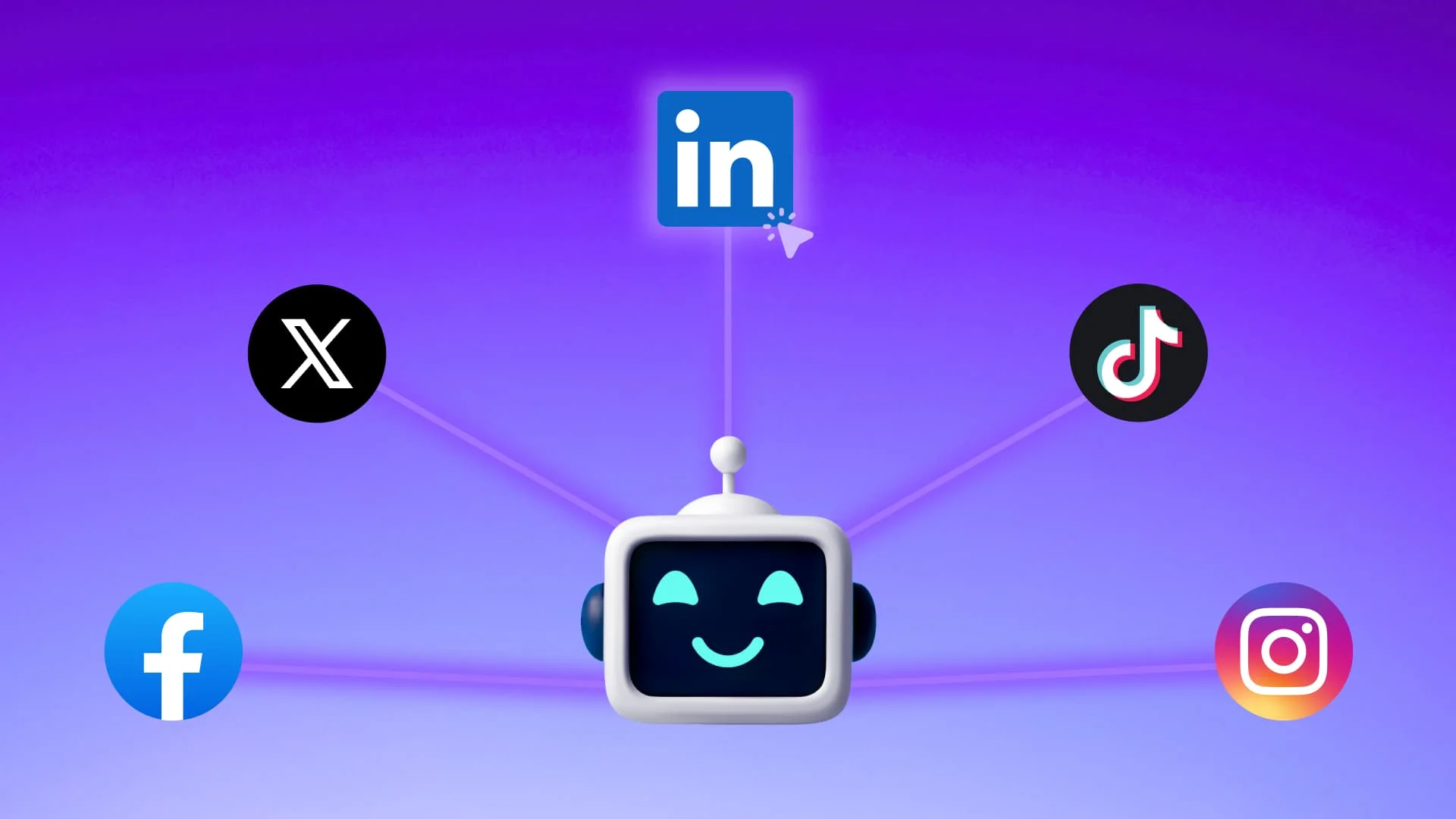
10 Ways to Use AI in Social Media
Stay ahead of the curve by learning how to properly use AI in social media.
Published on August 25, 2025
11 min to read
Employee Advocacy Video Strategies for Authentic Brand Storytelling
Summarize with AI

Summarize with AI
ChatGPT
Claude
Perplexity
Share
Vista Social
X (Twitter)
Table of contents
Summarize with AI
ChatGPT
Claude
Perplexity
Share
Vista Social
X (Twitter)
Ever feel like your brand stories fall flat—too polished, too salesy, or just not connecting?
That’s where employee advocacy video strategies come in.
No matter how great your brand is, people don’t connect with faceless logos. They connect with people. And the best people to represent your brand are already on your team—your employees.
Put them in front of the camera and suddenly your content feels authentic, relatable, and engaging.
Instead of stiff scripts, you get real voices, real faces, and real moments that resonate.
The result?
Videos that feel genuine, build trust, and give your brand a personality people actually want to follow.
In this guide, we’ll break down proven strategies to turn employees into video storytellers and transform everyday moments into powerful brand advocacy.
Ready to swap cookie-cutter campaigns for content that truly resonates?
Let’s dive in.
Table of contents
What are employee advocacy video strategies?
Employee advocacy video strategies are planned approaches businesses use to get employees involved in creating and sharing video content that highlights the brand in an authentic, human way.
Instead of relying only on polished brand ads or official company channels, these strategies tap into the credibility and relatability of real employees.
Essentially, the goal of employee advocacy video strategies is to build trust, amplify reach, and create genuine connections with followers and target audiences.
People trust content shared by employees far more than content from brands, making these strategies crucial for telling your brand’s story in a more authentic and relatable way.
Why you need employee advocacy video strategies
Below are several benefits of employee advocacy and why it’s crucial for brand storytelling that actually sticks.
Cuts through content fatigue
People are DROWNING in ads.
From social feeds to streaming platforms, audiences are hit with so much branded content that most of it barely registers before they scroll past.
That’s where employee advocacy videos have a major advantage.
The videos feature real people instead of scripted spokesmodels, making them feel less like marketing and more like authentic storytelling.
A quick “day in the life” clip, a behind-the-scenes moment, or even a candid employee perspective instantly stands out in a sea of polished ads.
The authenticity grabs attention AND keeps it.
When content feels genuine, audiences are far more likely to stop, watch, and engage, helping your brand cut through the noise and make a lasting impression.
Humanizes your brand
Your employees are the heartbeat of your brand—the real people behind the products, services, and customer experiences.
Featuring them in videos takes your brand from corporate to human.
Your audience gets to see authentic faces, hear real voices, and connect with genuine stories.
This kind of content adds warmth, relatability, and credibility that even the most polished logo, tagline, or ad campaign can’t deliver.
Instead of feeling like they’re being “marketed to,” your audience feels like they’re being invited into a conversation.
That human connection can help your brand build trust and make it memorable long after your video ends.
Expands your reach
Your brand page can only go so far on its own, but your employees can take it further.
They each have their own networks full of friends, family, colleagues, and professional connections.
When employees share advocacy videos on their personal social media, your message suddenly travels well beyond your brand’s usual followers.
That’s instant organic amplification.
Every share places your brand in front of new audiences who may never have discovered you otherwise.
Also, because the content comes from someone they know and trust, those viewers are more likely to stop, watch, and engage.
The result: Employee advocacy helps your reach grow exponentially.
Your brand visibility also skyrockets, and you achieve the kind of authentic brand awareness that paid ads often struggle to deliver.
Builds a stronger company culture
Handing employees the mic (or camera!) isn’t just about making videos but about giving them a voice.
When your employees share their stories, perspectives, and experiences, it creates a sense of ownership and pride in your brand.
They feel trusted, valued, and included, which naturally strengthens morale and team spirit.
Plus, employee advocacy videos showcase your company culture in action, not just in words.
Potential customers and future hires get a peek into what it’s really like behind the scenes, and employees see themselves as part of something bigger than their job title.
The ripple effect?
A stronger internal culture that radiates outward and makes your brand more attractive to both audiences and talent.
Drives engagement
The truth is that people are quick to ignore anything that feels like a polished ad.
Authentic, unscripted employee videos flip the script by feeling more like real conversations.
Viewers are more likely to view, share, and comment because your advocacy content feels relatable, personal, and human.
Social platforms reward this kind of interaction.
Algorithms prioritize content that sparks genuine engagement, meaning your employee advocacy videos are more likely to surface in feeds, reach wider audiences, and stay visible longer.
10 tried and true employee advocacy video strategies
Check out the powerful employee advocacy video and marketing strategies (plus real-world examples) below to inspire your content and next campaign.
1. Day-in-the-life videos
Many social media audiences love stepping into another person’s shoes.
A “day in the life” video captures your employee’s routine, work process, and even little quirks that make their role unique.
The videos can make your brand feel less like a faceless company and more like a collection of interesting humans doing meaningful work.
Salesforce nails this by sharing LinkedIn videos where employees walk viewers through their daily schedules, blending personal passions with professional life.
It makes their company culture feel approachable, while showing that their people aren’t just workers but relatable humans.
You can encourage your employees to film casually with their phones.
The less polished it looks, the more authentic it feels.
2. Behind-the-scenes content
Behind-the-scenes videos show the “messy middle” of your brand, from the creative process and product testing to event prep.
Transparency like this helps your brand build trust and make customers feel like they’re in on something special.
For example, Starbucks frequently shares TikToks of baristas crafting drinks, experimenting with new recipes, or joking with coworkers.
@itsjoboi Velvet Hot Chocolate is just too DELICIOUS at Starbucks #fyp #viral #trend #starbucks #barista ♬ It's Beginning to Look a Lot like Christmas – Michael Bublé
The clips humanize the brand and give fans a peek at the real personalities making their daily lattes.
Consider letting your employees film small moments (while still providing guidelines), such as setting up for a meeting or decorating the office.
They may seem ordinary to you, but they feel authentic and fascinating to outsiders.
3. Employee generated testimonials
Traditional ads are often ignored, but employee testimonials hit differently.
When team members speak candidly about why they love your company or why they stand by your product, it feels believable to audiences.
After all, people can sense when someone is being genuine versus reading a script.
For instance, B2B companies like Adobe highlight employees and their journey through the company to help showcase culture and bring on new talent.
The content gets reshared across personal LinkedIn or Instagram profiles, extending reach far beyond Adobe’s own channels.
Additional tip: Ask employees to share stories instead of generic praise.
For example, “I was supported during my career switch” is more engaging than “This is a great company to work for.”
4. Culture highlight Reels
Think of company culture highlight Reels like your brand’s feature film.
Compile fun, vibrant clips of celebrations, team outings, or charity work to showcase your company values in action.
The Reels reinforce that your company cares about more than profits.
Here’s great example from HubSpot of what this type of highlight Reel could look like.
The energy is infectious, and it makes their brand feel warm, approachable, and people-first.
You can use upbeat music and quick cuts for employee advocacy posts like this to keep energy high.
Culture Reels should feel like a party, not like a corporate slideshow.
5. Customer success collaborations
The most powerful stories happen when employees and customers share the screen.
Employees explain the “why” behind the product, while customers share the results they’ve experienced.
It’s a storytelling combo that’s authentic, balanced, and compelling.
Typeform mastered this by featuring customer success stories and interviews on its YouTube channel.
It’s like getting both sides of the story in one video.
Remember to keep your customer success collaboration videos conversational.
Try not to script it and let employees (or collaborators) and customers interact naturally.
That chemistry is what makes it engaging.
6. Social media takeovers
Hand over the keys!
Letting employees “take over” your brand’s Instagram, TikTok, or LinkedIn feed gives audiences fresh voices and perspectives.
It also builds trust internally because your employees feel empowered to represent your brand.
Marriott Hotels runs Instagram Stories takeovers where staff showcase their shifts, guest interactions, and personal tips for travelers.
The result?
Followers get to see Marriott through the eyes of real people, not just marketing.
Consider giving your employees loose guidelines while encouraging their personalities to shine.
A takeover should feel fun and spontaneous, not overly curated, to connect with audiences genuinely.
7. Tips, tutorials, and industry insights
Your employees have knowledge worth sharing, so let them be the experts.
Quick how-to videos or industry tips provide value to your audience while spotlighting employee talent.
It positions your brand as approachable and authoritative without feeling too salesy.
Canva encourages team members to create design hack videos, from color palette tips to layout tricks.
These short tutorials add value while showing off the brains behind the brand.
Keep your employee advocacy tutorials short and snackable—under 60 seconds works best for TikTok and Instagram.
8. Celebrating milestones and wins
Milestone videos shine because they feel uplifting and personal.
Whether celebrating an employee anniversary, hitting team goals, or closing a big project, these videos showcase pride and gratitude.
They also tell the world that your brand truly values its people.
For example, DHL celebrates a yearly DHL Freight Star Award to celebrate the company’s employees of the year.
The video creates authentic, feel-good, and relevant content that builds both brand credibility and employee loyalty.
You can also capture reactions in the moment (such as surprise celebrations or team cheers).
Raw emotion beats staged messaging every time.
9. Employee spotlights or meet the team series
Spotlight videos put faces to your brand name.
These short, personality-driven clips introduce your employees through fun questions, personal stories, or behind-the-scenes snippets.
It’s a great way to show diversity and make your brand more relatable.
Columbia Sportswear creates videos highlighting its employees on its @lifeatcolumbiasportswear Instagram profile.
The campaigns show that their employees aren’t just cogs in a machine but individuals with inspiring stories.
Quick tip: Mix in fun questions (“Coffee or tea?” / “Best karaoke song?”) with professional ones. It makes the spotlights more engaging and human.
10. Event recaps and vlogs
Events can feel like a big “You had to be there” moment, but with recap videos, your audience gets the chance to be “there.”
Employees recording vlogs or highlights from conferences, launches, or team retreats can make your events come alive for those who couldn’t attend.
ClickUp interviewed team members while sharing highlight footage from its recent team conference.
The employee perspective makes these events feel more exciting, not staged.
You can use a mix of clips, such as presentations, crowd reactions, and casual selfies, to create a dynamic, authentic recap that feels like a memory reel.
How to use Vista Social to implement employee advocacy video strategies
Employee advocacy is more powerful (and more authentic) than ever, especially when video enters the mix.
With Vista Social, rolling out your employee advocacy strategy isn’t just doable but streamlined, scalable, and even fun.
Start by planning and creating the kind of videos you want employees to share, such as:
- Culture clips (office tours, team bonding, or a day-in-the-life)
- Customer shoutouts or success stories
- Quick product tips or feature demos
- Behind-the-scenes content
- Trending topics or challenges
Once you have these locked in, you can start creating your advocacy program on Vista Social.
To access the platform’s Employee Advocacy feature, select the Advocacy option on your Vista Social dashboard’s main menu.
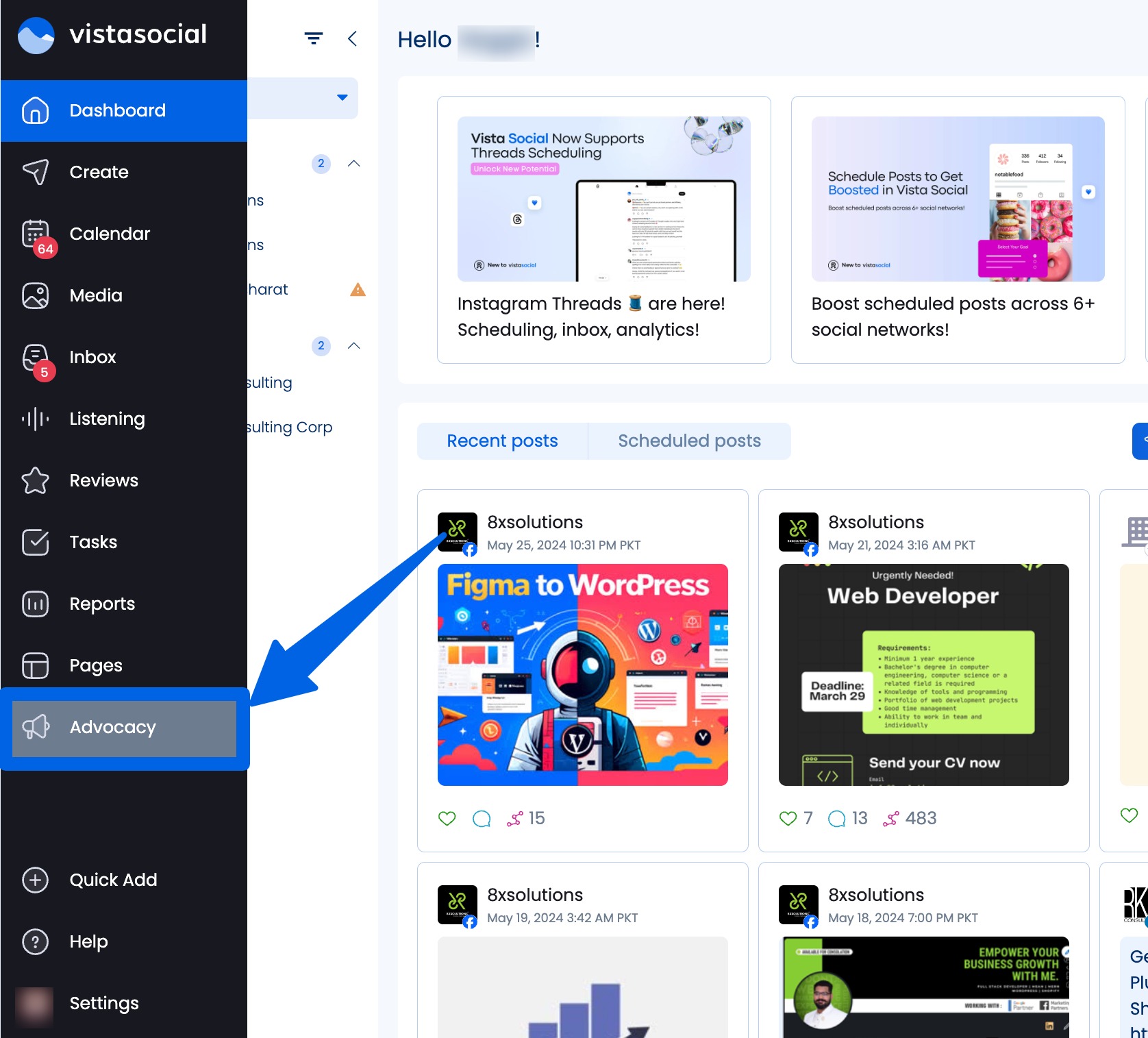
Select + Create advocacy on the top-right corner.
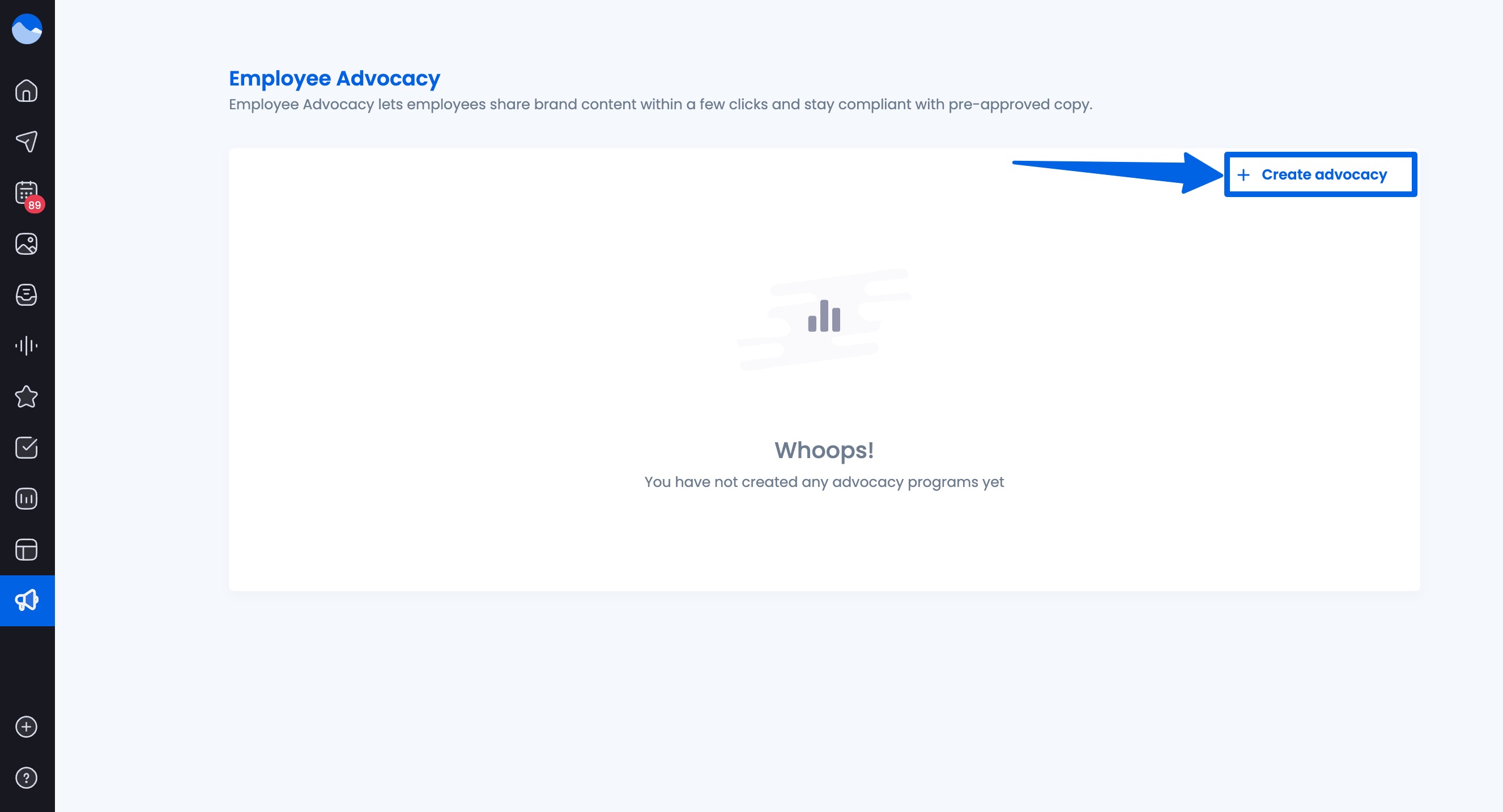
You can create one advocacy for each profile group.
Next, choose the profile group you want for this advocacy, provide the necessary details, and click Create.
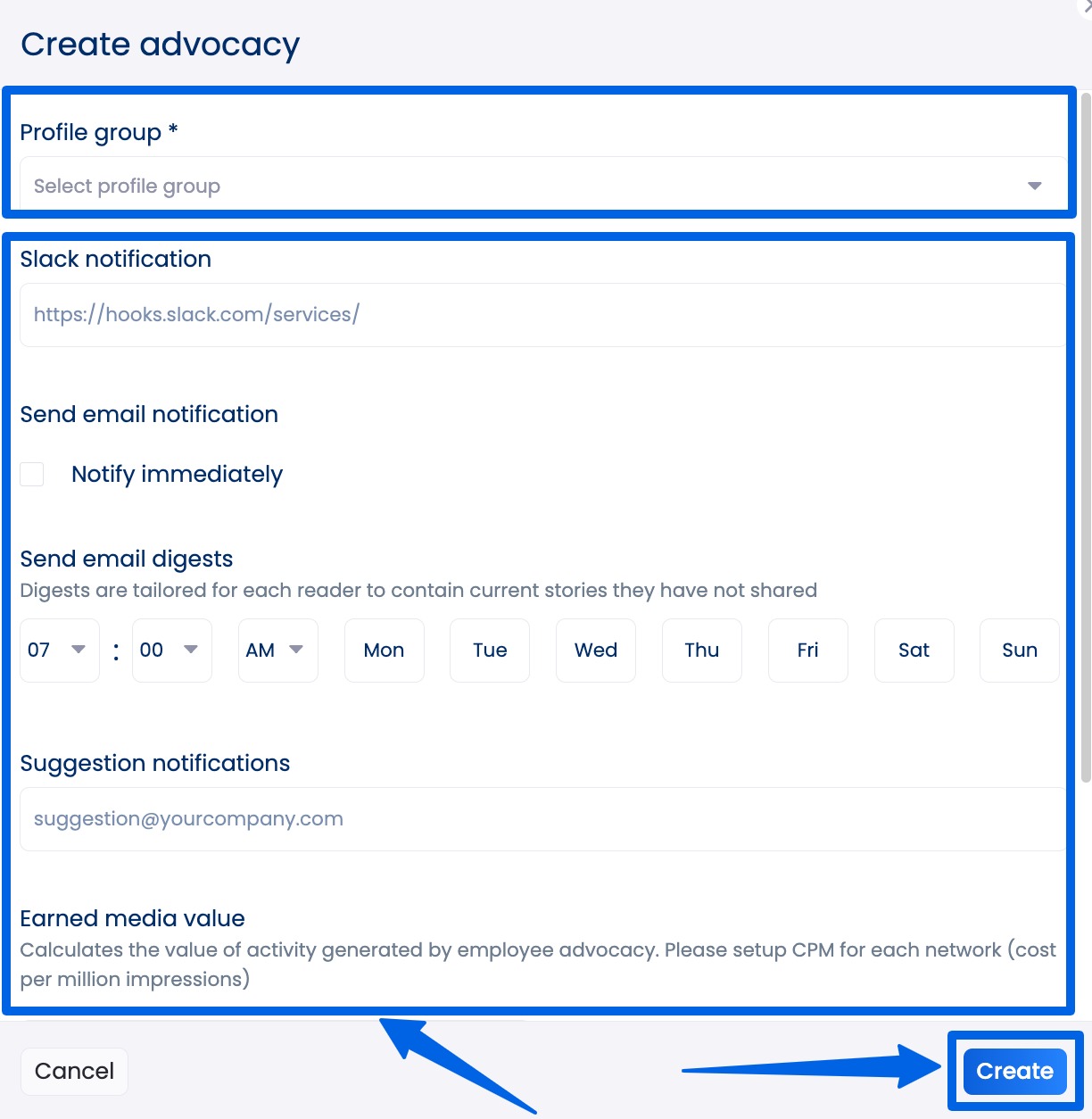
The next step is to invite your employee advocates.
Note: Vista Social for social media management and employee advocacy, users who are part of your SMM team can’t use the same email address to join your advocacy program.
Now, you can invite advocates in two ways:
- Uploading a CSV file containing the advocates’ names and email addresses
- Manually adding users

Here’s what the two methods look like.
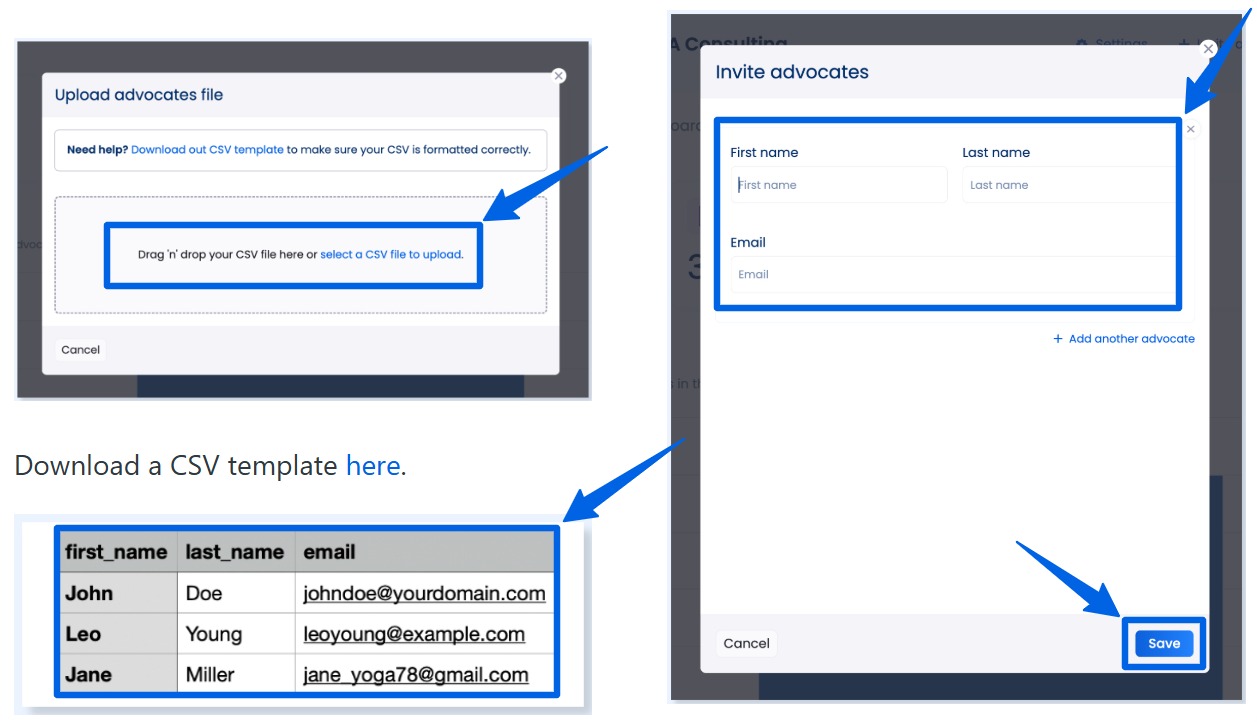
Now that your advocacy program is up and running, you can start creating company content that your employees or advocates can share.
There are two types of advocacy content on Vista Social:
- Advocacy-only content that was created by your admins and made available for sharing to your employees’ personal social networks as a new organic post
- Published content pieces, which are posts that were already published to your company’s social media platform, and are available for your employees to like, comment, repost, and share
To create advocacy content (including videos), go to Advocacy on your dashboard, click Schedule advocacy post, and select your preferred option.
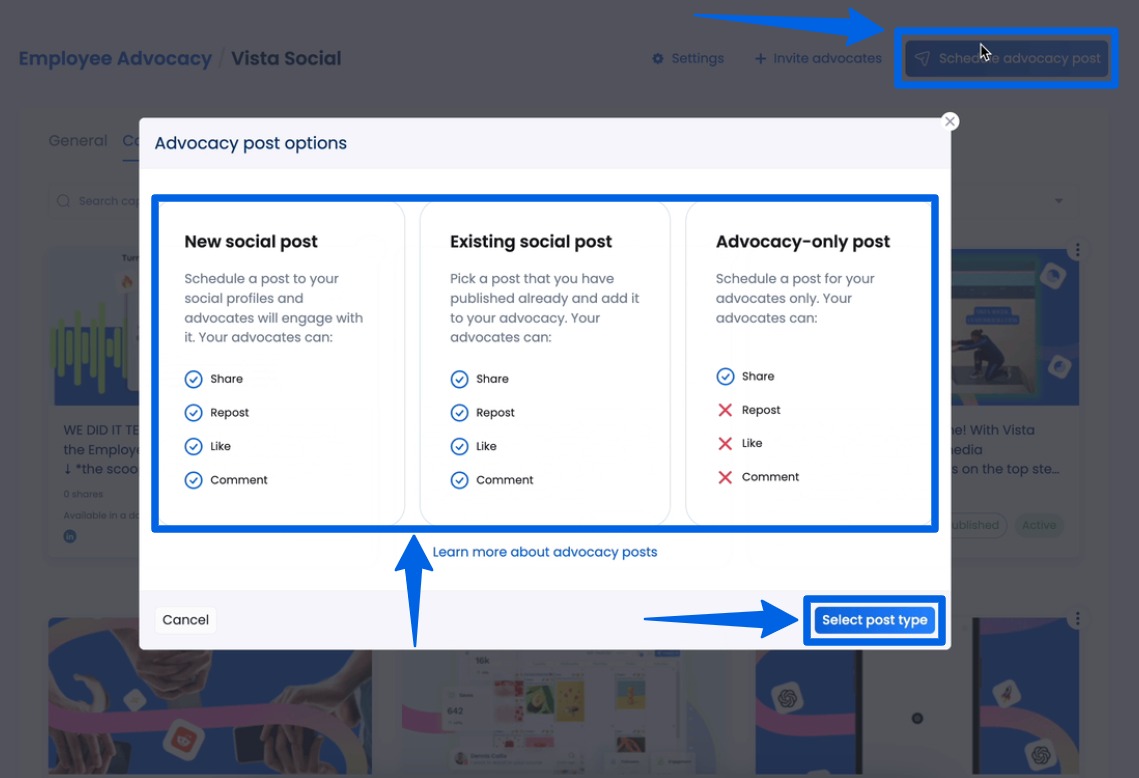
Create and customize your advocacy post by uploading the video, adding captions, hashtags, emojis, etc., setting it to auto-publish, and more.
You can also specify the connected social media profiles where you want to publish your advocacy video.
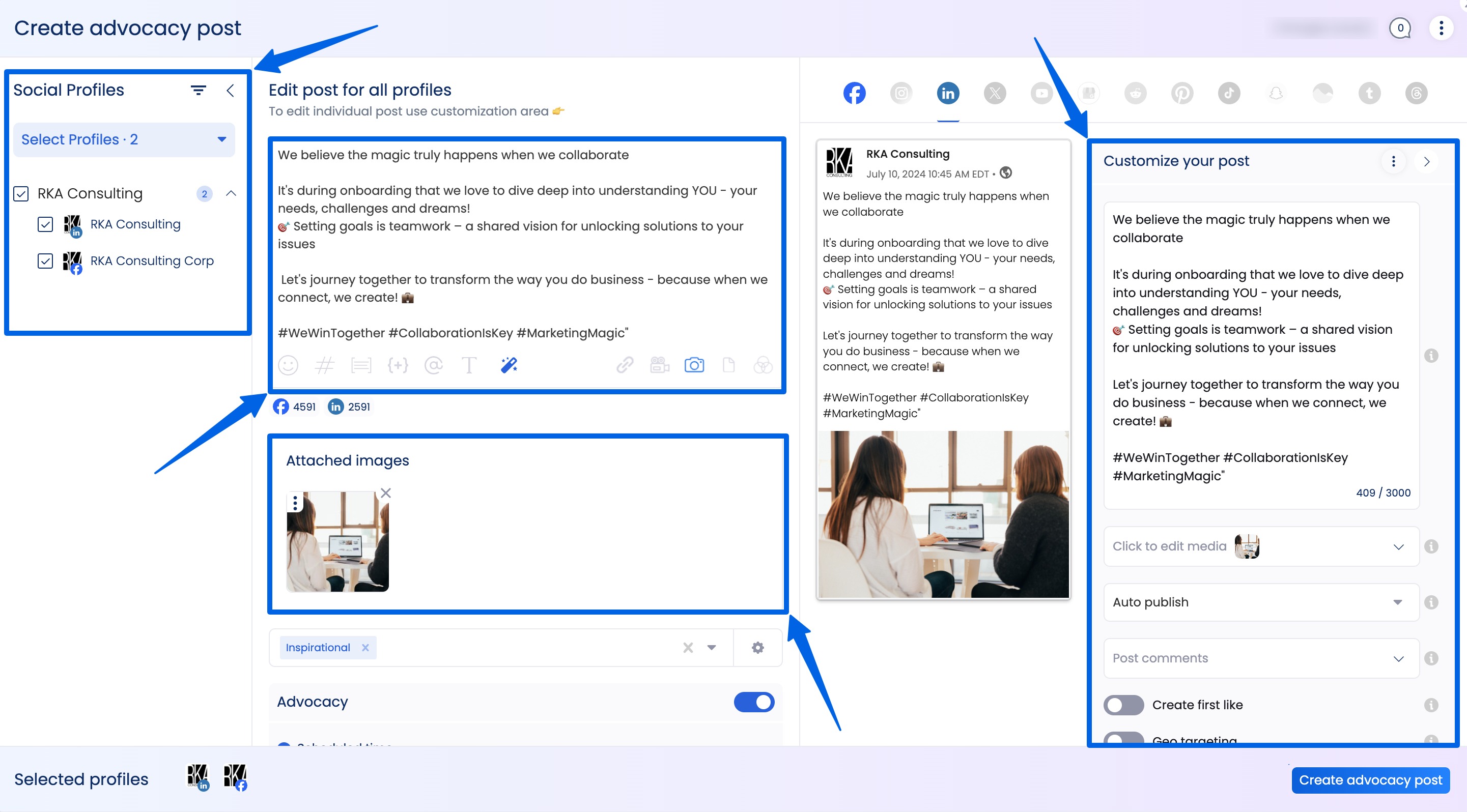
Want to come up with engaging captions fast? Use the AI Assistant (Magic wand icon) to generate post descriptions and taglines.
You can also use it to suggest refined versions of your written text.
The Advocacy toggle button (below the tags option) is enabled by default when you create it from the Advocacy area.
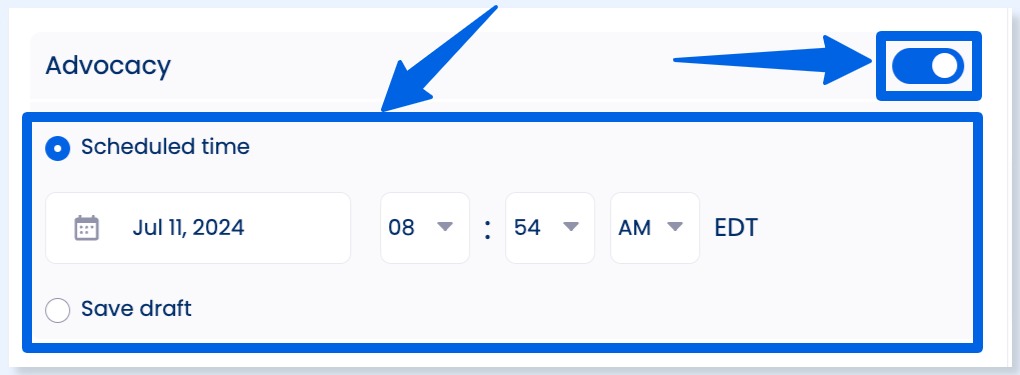
You can schedule a time for when your advocacy post is made available to your employees. You can also save the post as a draft.
You can also create and schedule a post via the social media publishing feature and turn it into an Advocacy post.
To do this, switch on the Add to advocacy option and select your desired option when advocates can share the post.
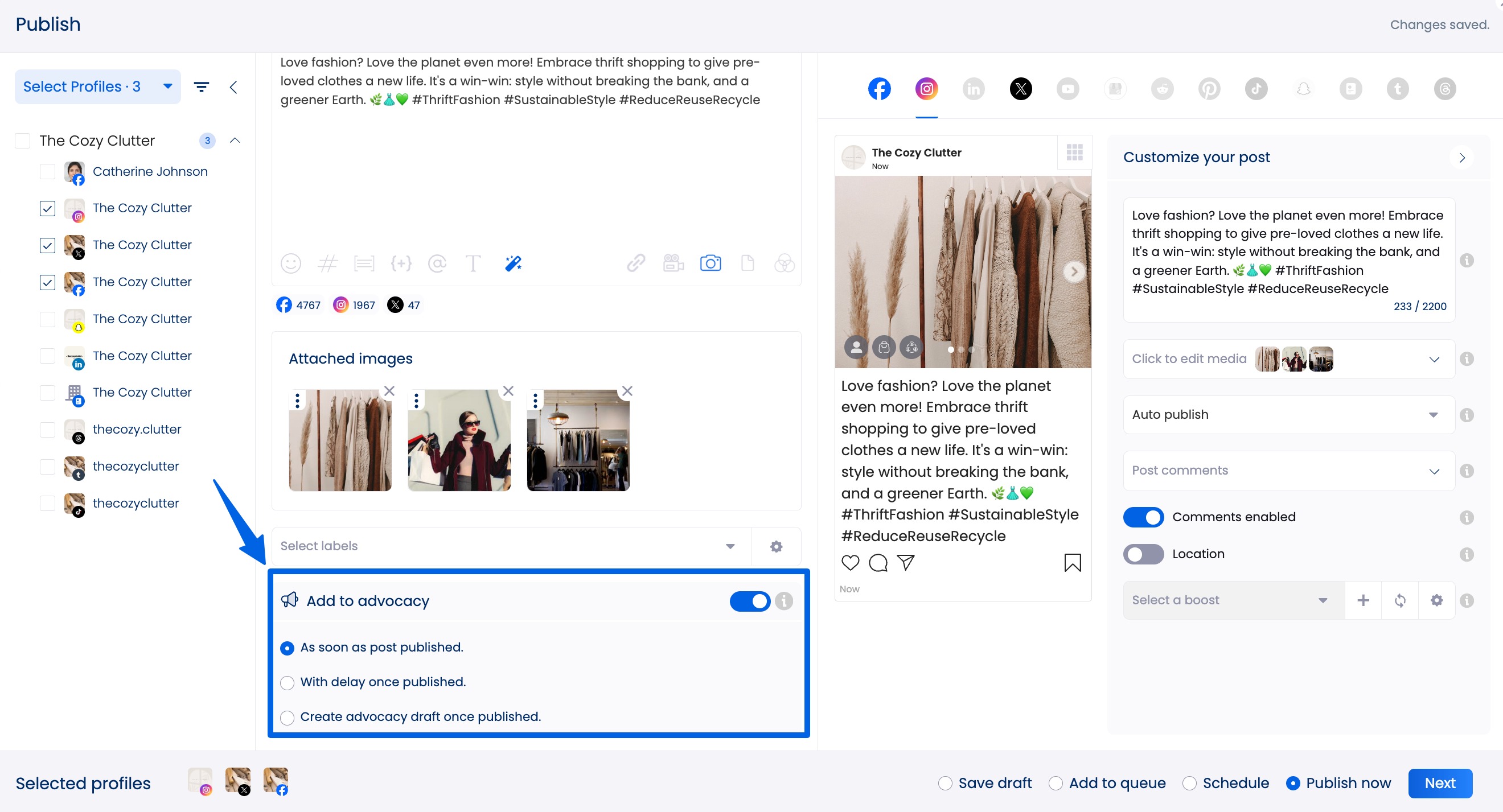
Vista Social’s employee advocacy platform lets you manage everything from one dashboard.
The Advocacy dashboard shows all your advocacy programs. Click each one to access a dashboard specific to each program.

Here, you’ll see the following:
- General
- Content
- Activity
- Leaderboard
- Advocates
Click each one to view and manage it. For example, selecting the General tab gives you a quick overview of key metrics and numbers.

These can help you determine what’s working based on:
- Who’s sharing the most
- Which videos are getting the most reach and engagement
- Whether certain types of content outperform others
Ready to put your employee advocacy video strategies into action?
People connect with people, not logos or taglines.
That is why employee advocacy video strategies are so powerful since they turn your employees into authentic storytellers who bring your brand to life in ways traditional marketing simply can’t.
Whether behind-the-scenes clips, personal spotlights, or culture-driven reels, these videos build trust, expand reach, and humanize your brand.
Ready to implement your video strategies and manage your advocacy content with ease?
Create your Vista Social account today.
FAQs on employee advocacy video strategies
Why should video be part of your employee advocacy program?
Video is the most engaging content format, with audiences twice as likely to share it compared to other posts.
On platforms such as TikTok, LinkedIn, and Instagram, authentic employee videos keep audiences from scrolling past because they feel more like real stories than marketing campaigns.
Do employee advocacy videos need professional production?
Not at all.
Overproduced videos often look too polished and can lose their authenticity.
A simple phone-recorded clip of an employee sharing their story is often more effective than a professionally produced video, especially with social audiences who value real over perfect.
How do you motivate your employees to create advocacy videos?
Recognition goes a long way in boosting employee participation.
Spotlight employees whose videos perform well, give shout-outs during internal meetings, or create small incentives such as gift cards or extra perks.
The bigger motivator, though, is showing employees the impact. When they see their videos driving real engagement and positive comments, they’ll likely want to create more.
How often should you post employee advocacy videos?
It depends on your advocacy efforts, goals, and campaign.
You can start small, such as posting one to two videos per month, which is a great pace.
As momentum builds (and more employees jump in), you can increase frequency or even launch a recurring series such as “Friday Feels” or “Coffee with [Employee Name].”
It’s best to focus on consistency over volume.
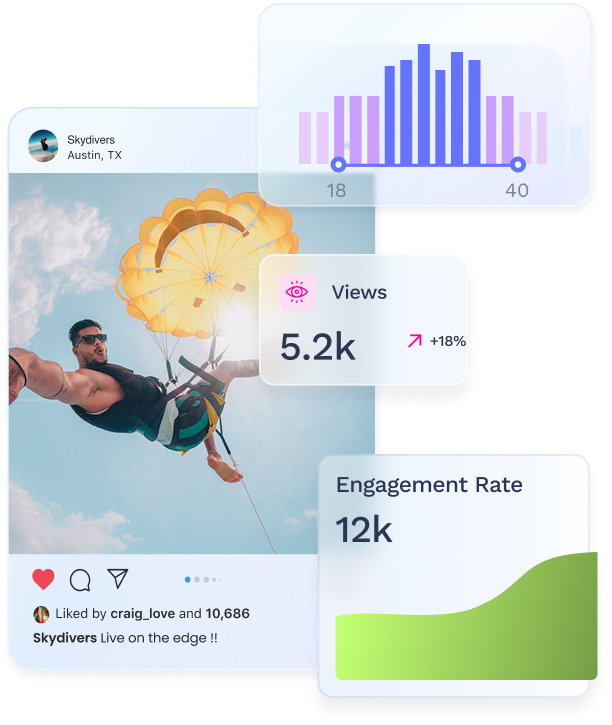
Try Vista Social for free
A social media management platform that actually helps you grow with easy-to-use content planning, scheduling, engagement and analytics tools.
Get Started NowAbout the Author
Content Writer
Jimmy Rodela is a social media and content marketing consultant with over 9 years of experience, with work appearing on sites such as Business.com, Yahoo, SEMRush, and SearchEnginePeople. He specializes in social media, content marketing, SaaS, small business strategy, marketing automation, and content development.
Read with AI
Save time reading this article using your favorite AI tool
Summarize with AI
Never Miss a Trend
Our newsletter is packed with the hottest posts and latest news in social media.
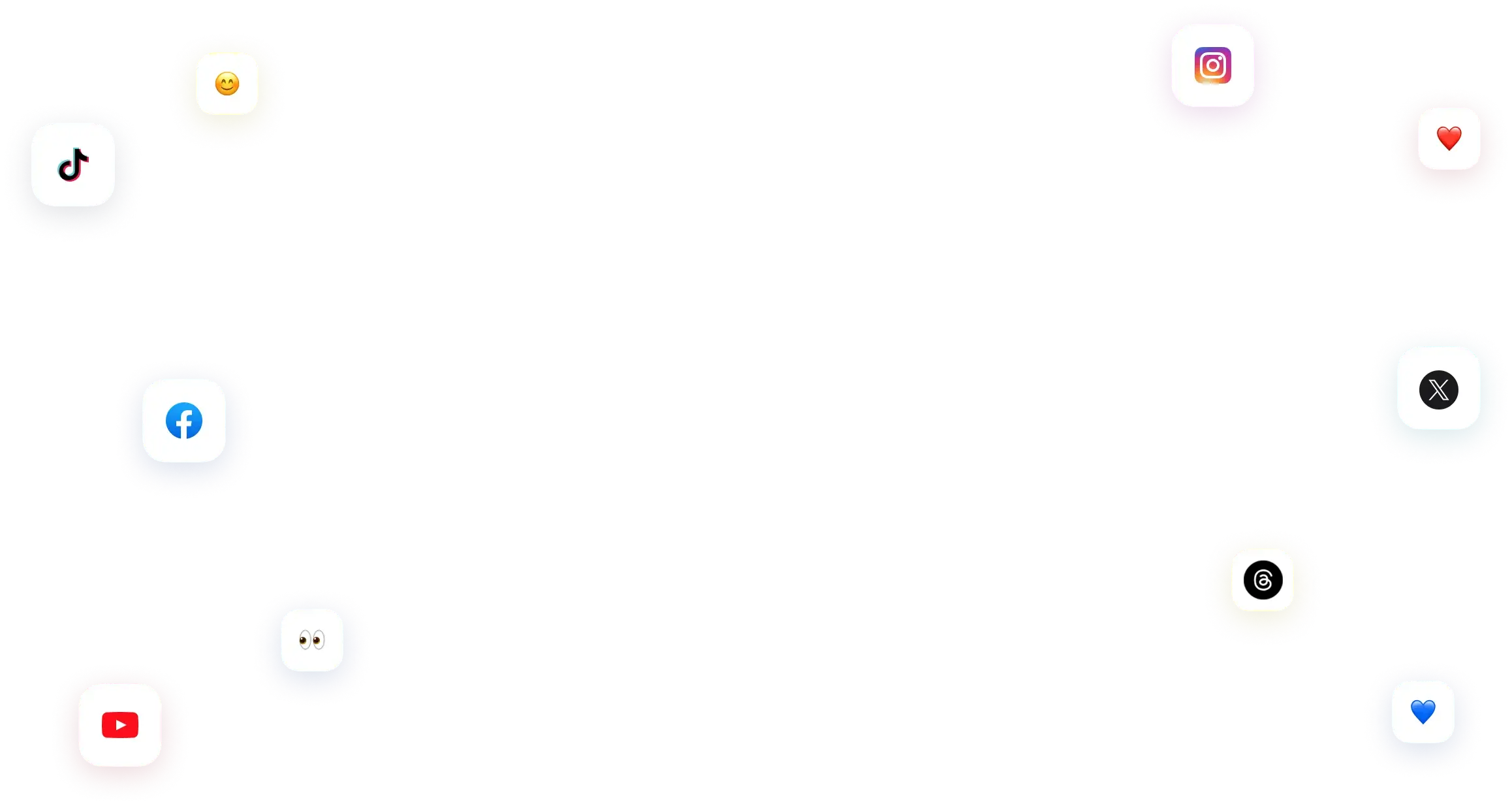
You have many things to do.
Let us help you with social media.
Use our free plan to build momentum for your social media presence.
Or skip ahead and try our paid plan to scale your social media efforts.
P.S. It will be a piece of cake 🍰 with Vista Social
Subscribe to our Newsletter!
To stay updated on the latest and greatest Social Media news. We promise not to spam you!
Enjoyed the Blog?
Hear More on Our Podcast!
Dive deeper into the conversation with industry insights & real stories.


